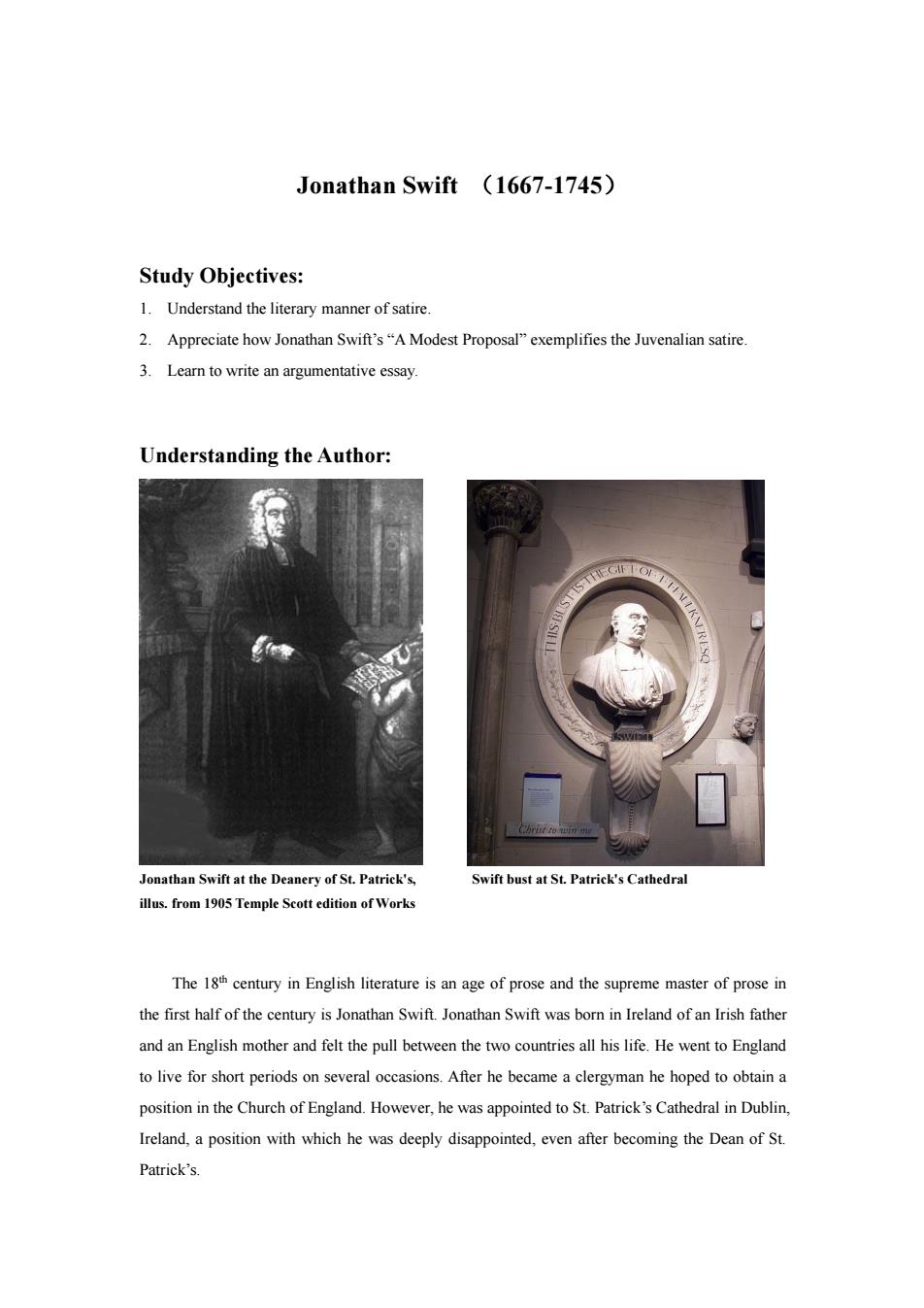
Jonathan Swift (1667-1745) Study Objectives: 1.Understand the literary manner of satire. 2.Appreciate how Jonathan Swift's"A Modest Proposal"exemplifies the Juvenalian satire. 3.Learn to write an argumentative essay. Understanding the Author: Jonathan Swift at the Deanery of St.Patrick's, Swift bust at St.Patrick's Cathedral illus.from 1905 Temple Scott edition of Works The 18th century in English literature is an age of prose and the supreme master of prose in the first half of the century is Jonathan Swift.Jonathan Swift was born in Ireland of an Irish father and an English mother and felt the pull between the two countries all his life.He went to England to live for short periods on several occasions.After he became a clergyman he hoped to obtain a position in the Church of England.However,he was appointed to St.Patrick's Cathedral in Dublin, Ireland,a position with which he was deeply disappointed,even after becoming the Dean of St. Patrick's
Jonathan Swift (1667-1745) Study Objectives: 1. Understand the literary manner of satire. 2. Appreciate how Jonathan Swift’s “A Modest Proposal” exemplifies the Juvenalian satire. 3. Learn to write an argumentative essay. Understanding the Author: Jonathan Swift at the Deanery of St. Patrick's, Swift bust at St. Patrick's Cathedral illus. from 1905 Temple Scott edition of Works The 18 th century in English literature is an age of prose and the supreme master of prose in the first half of the century is Jonathan Swift. Jonathan Swift was born in Ireland of an Irish father and an English mother and felt the pull between the two countries all his life. He went to England to live for short periods on several occasions. After he became a clergyman he hoped to obtain a position in the Church of England. However, he was appointed to St. Patrick’s Cathedral in Dublin, Ireland, a position with which he was deeply disappointed, even after becoming the Dean of St. Patrick’s
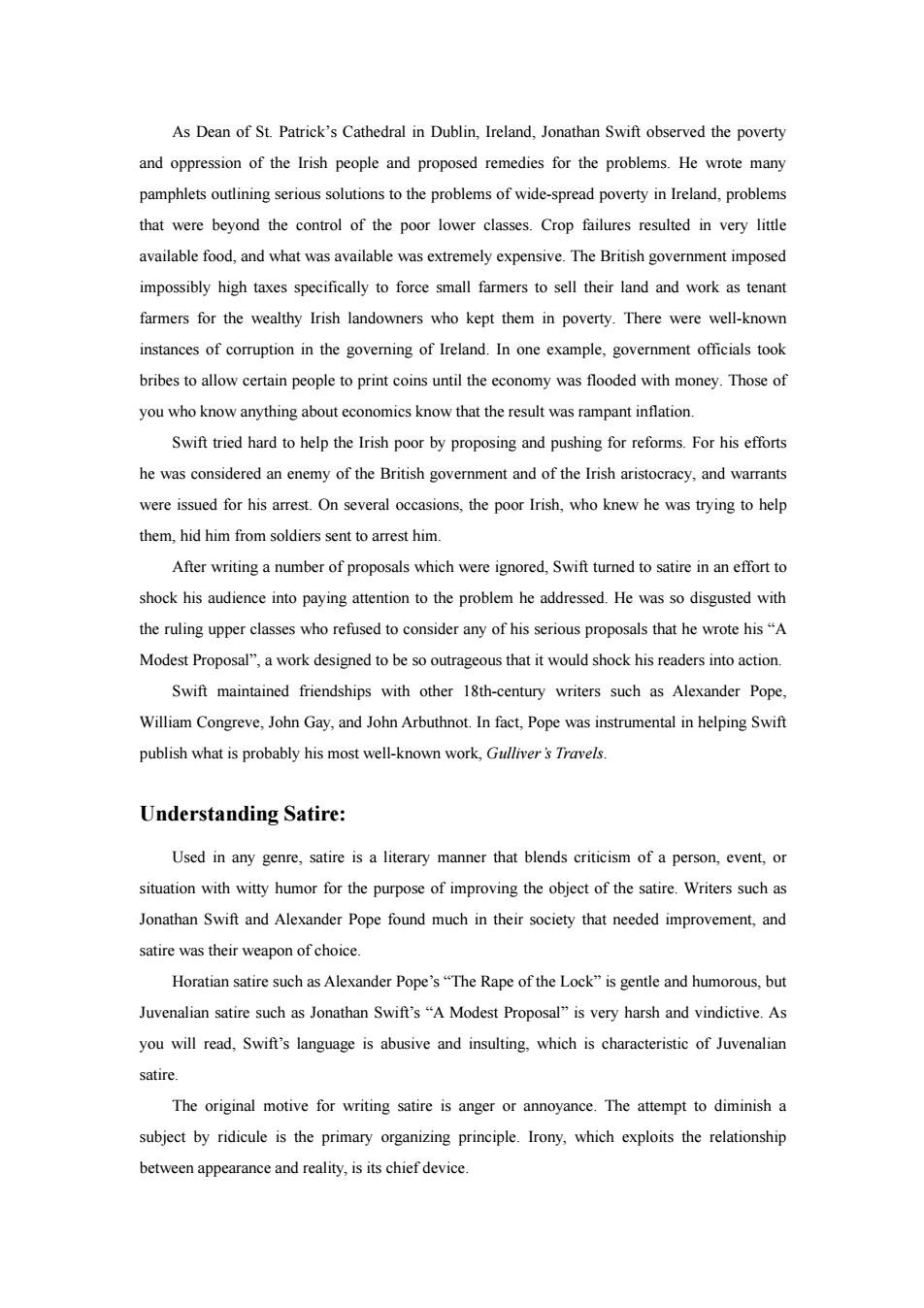
As Dean of St.Patrick's Cathedral in Dublin,Ireland,Jonathan Swift observed the poverty and oppression of the Irish people and proposed remedies for the problems.He wrote many pamphlets outlining serious solutions to the problems of wide-spread poverty in Ireland,problems that were beyond the control of the poor lower classes.Crop failures resulted in very little available food,and what was available was extremely expensive.The British government imposed impossibly high taxes specifically to force small farmers to sell their land and work as tenant farmers for the wealthy Irish landowners who kept them in poverty.There were well-known instances of corruption in the governing of Ireland.In one example,government officials took bribes to allow certain people to print coins until the economy was flooded with money.Those of you who know anything about economics know that the result was rampant inflation. Swift tried hard to help the Irish poor by proposing and pushing for reforms.For his efforts he was considered an enemy of the British government and of the Irish aristocracy,and warrants were issued for his arrest.On several occasions,the poor Irish,who knew he was trying to help them.hid him from soldiers sent to arrest him. After writing a number of proposals which were ignored,Swift turned to satire in an effort to shock his audience into paying attention to the problem he addressed.He was so disgusted with the ruling upper classes who refused to consider any of his serious proposals that he wrote his"A Modest Proposal",a work designed to be so outrageous that it would shock his readers into action. Swift maintained friendships with other 18th-century writers such as Alexander Pope, William Congreve,John Gay,and John Arbuthnot.In fact,Pope was instrumental in helping Swift publish what is probably his most well-known work,Gulliver 's Travels. Understanding Satire: Used in any genre,satire is a literary manner that blends criticism of a person,event,or situation with witty humor for the purpose of improving the object of the satire.Writers such as Jonathan Swift and Alexander Pope found much in their society that needed improvement,and satire was their weapon of choice. Horatian satire such as Alexander Pope's"The Rape of the Lock"is gentle and humorous,but Juvenalian satire such as Jonathan Swift's "A Modest Proposal"is very harsh and vindictive.As you will read,Swift's language is abusive and insulting,which is characteristic of Juvenalian satire The original motive for writing satire is anger or annoyance.The attempt to diminish a subject by ridicule is the primary organizing principle.Irony,which exploits the relationship between appearance and reality,is its chief device
As Dean of St. Patrick’s Cathedral in Dublin, Ireland, Jonathan Swift observed the poverty and oppression of the Irish people and proposed remedies for the problems. He wrote many pamphlets outlining serious solutions to the problems of wide-spread poverty in Ireland, problems that were beyond the control of the poor lower classes. Crop failures resulted in very little available food, and what was available was extremely expensive. The British government imposed impossibly high taxes specifically to force small farmers to sell their land and work as tenant farmers for the wealthy Irish landowners who kept them in poverty. There were well-known instances of corruption in the governing of Ireland. In one example, government officials took bribes to allow certain people to print coins until the economy was flooded with money. Those of you who know anything about economics know that the result was rampant inflation. Swift tried hard to help the Irish poor by proposing and pushing for reforms. For his efforts he was considered an enemy of the British government and of the Irish aristocracy, and warrants were issued for his arrest. On several occasions, the poor Irish, who knew he was trying to help them, hid him from soldiers sent to arrest him. After writing a number of proposals which were ignored, Swift turned to satire in an effort to shock his audience into paying attention to the problem he addressed. He was so disgusted with the ruling upper classes who refused to consider any of his serious proposals that he wrote his “A Modest Proposal”, a work designed to be so outrageous that it would shock his readers into action. Swift maintained friendships with other 18th-century writers such as Alexander Pope, William Congreve, John Gay, and John Arbuthnot. In fact, Pope was instrumental in helping Swift publish what is probably his most well-known work, Gulliver’s Travels. Understanding Satire: Used in any genre, satire is a literary manner that blends criticism of a person, event, or situation with witty humor for the purpose of improving the object of the satire. Writers such as Jonathan Swift and Alexander Pope found much in their society that needed improvement, and satire was their weapon of choice. Horatian satire such as Alexander Pope’s “The Rape of the Lock” is gentle and humorous, but Juvenalian satire such as Jonathan Swift’s “A Modest Proposal” is very harsh and vindictive. As you will read, Swift’s language is abusive and insulting, which is characteristic of Juvenalian satire.The original motive for writing satire is anger or annoyance. The attempt to diminish a subject by ridicule is the primary organizing principle. Irony, which exploits the relationship between appearance and reality, is its chief device
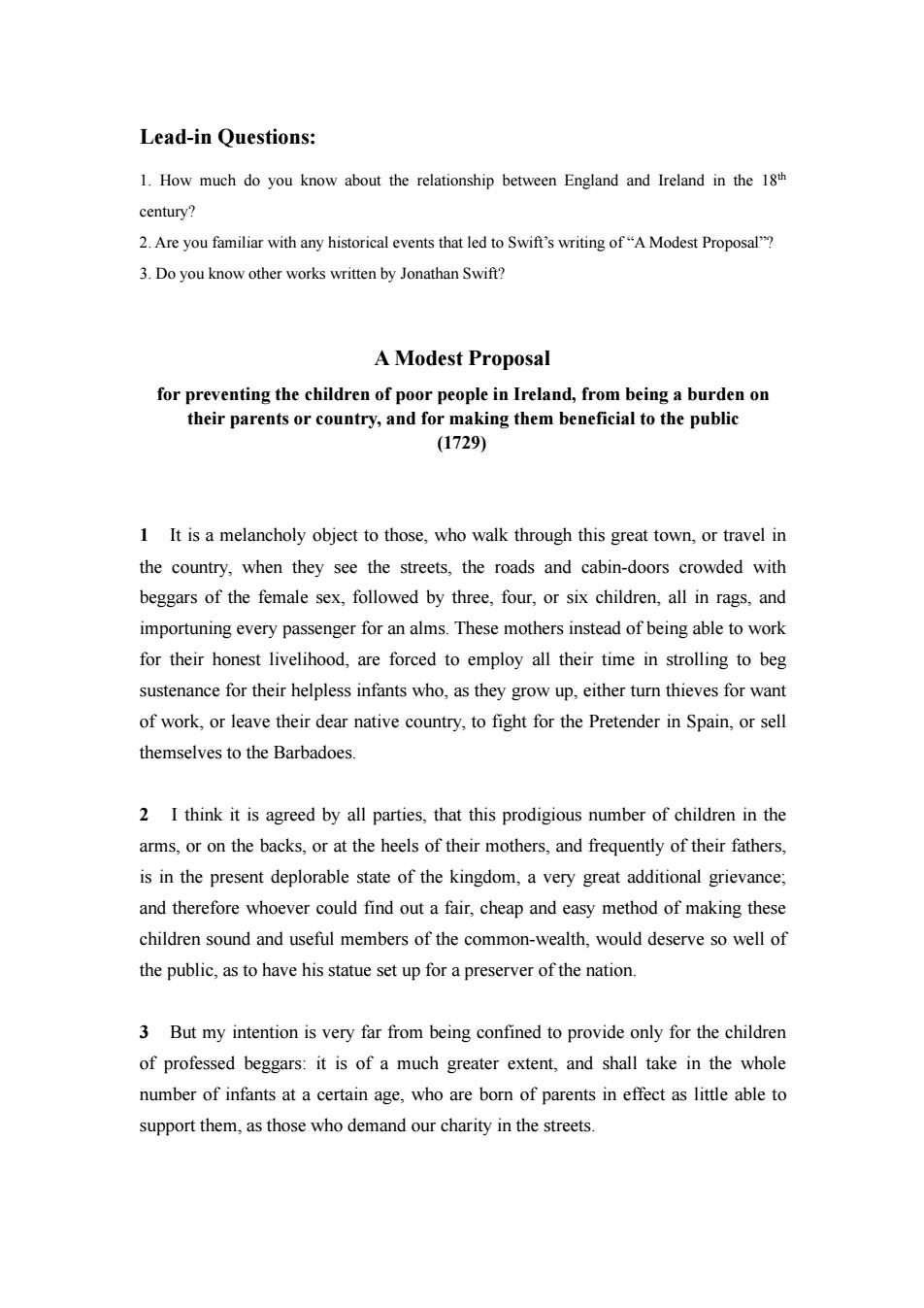
Lead-in Questions: 1.How much do you know about the relationship between England and Ireland in the 18th century? 2.Are you familiar with any historical events that led to Swift's writing of"A Modest Proposal"? 3.Do you know other works written by Jonathan Swift? A Modest Proposal for preventing the children of poor people in Ireland,from being a burden on their parents or country,and for making them beneficial to the public (1729) 1 It is a melancholy object to those,who walk through this great town,or travel in the country,when they see the streets,the roads and cabin-doors crowded with beggars of the female sex,followed by three,four,or six children,all in rags,and importuning every passenger for an alms.These mothers instead of being able to work for their honest livelihood,are forced to employ all their time in strolling to beg sustenance for their helpless infants who,as they grow up,either turn thieves for want of work,or leave their dear native country,to fight for the Pretender in Spain,or sell themselves to the Barbadoes. 2 I think it is agreed by all parties,that this prodigious number of children in the arms,or on the backs,or at the heels of their mothers,and frequently of their fathers, is in the present deplorable state of the kingdom,a very great additional grievance; and therefore whoever could find out a fair,cheap and easy method of making these children sound and useful members of the common-wealth,would deserve so well of the public,as to have his statue set up for a preserver of the nation. 3 But my intention is very far from being confined to provide only for the children of professed beggars:it is of a much greater extent,and shall take in the whole number of infants at a certain age,who are born of parents in effect as little able to support them,as those who demand our charity in the streets
Lead-in Questions: 1. How much do you know about the relationship between England and Ireland in the 18 th century? 2. Are you familiar with any historical events that led to Swift’s writing of “A Modest Proposal”? 3. Do you know other works written by Jonathan Swift? A Modest Proposal for preventing the children of poor people in Ireland, from being a burden on their parents or country, and for making them beneficial to the public (1729) 1 It is a melancholy object to those, who walk through this great town, or travel in the country, when they see the streets, the roads and cabin-doors crowded with beggars of the female sex, followed by three, four, or six children, all in rags, and importuning every passenger for an alms. These mothers instead of being able to work for their honest livelihood, are forced to employ all their time in strolling to beg sustenance for their helpless infants who, as they grow up, either turn thieves for want of work, or leave their dear native country, to fight for the Pretender in Spain, or sell themselves to the Barbadoes. 2 I think it is agreed by all parties, that this prodigious number of children in the arms, or on the backs, or at the heels of their mothers, and frequently of their fathers, is in the present deplorable state of the kingdom, a very great additional grievance; and therefore whoever could find out a fair, cheap and easy method of making these children sound and useful members of the common-wealth, would deserve so well of the public, as to have his statue set up for a preserver of the nation. 3 But my intention is very far from being confined to provide only for the children of professed beggars: it is of a much greater extent, and shall take in the whole number of infants at a certain age, who are born of parents in effect as little able to support them, as those who demand our charity in the streets
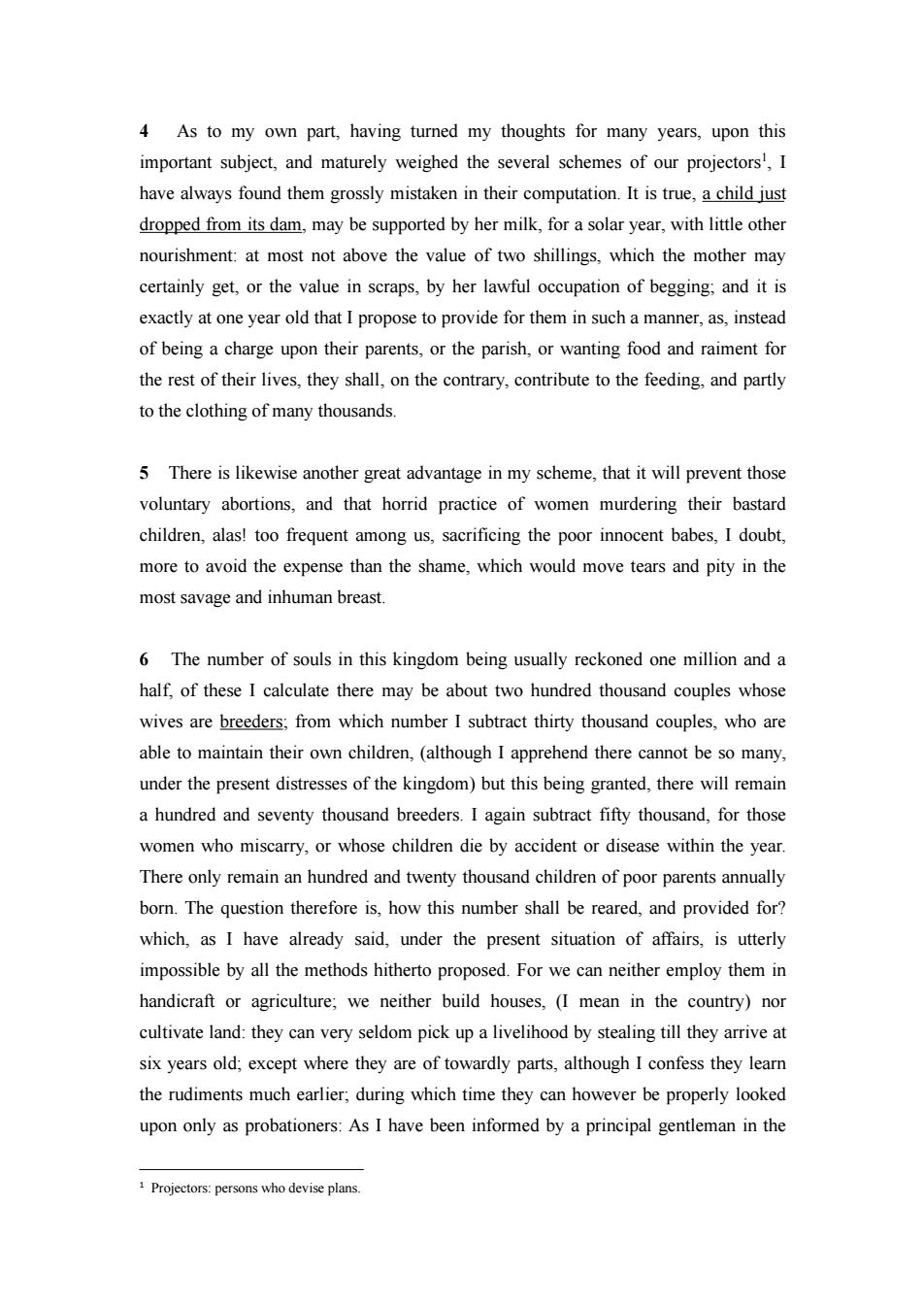
4 As to my own part,having turned my thoughts for many years,upon this important subject,and maturely weighed the several schemes of our projectors',I have always found them grossly mistaken in their computation.It is true,a child just dropped from its dam,may be supported by her milk,for a solar year,with little other nourishment:at most not above the value of two shillings,which the mother may certainly get,or the value in scraps,by her lawful occupation of begging;and it is exactly at one year old that I propose to provide for them in such a manner,as,instead of being a charge upon their parents,or the parish,or wanting food and raiment for the rest of their lives,they shall,on the contrary,contribute to the feeding,and partly to the clothing of many thousands. 5 There is likewise another great advantage in my scheme,that it will prevent those voluntary abortions,and that horrid practice of women murdering their bastard children,alas!too frequent among us,sacrificing the poor innocent babes,I doubt, more to avoid the expense than the shame,which would move tears and pity in the most savage and inhuman breast. 6 The number of souls in this kingdom being usually reckoned one million and a half,of these I calculate there may be about two hundred thousand couples whose wives are breeders;from which number I subtract thirty thousand couples,who are able to maintain their own children,(although I apprehend there cannot be so many, under the present distresses of the kingdom)but this being granted,there will remain a hundred and seventy thousand breeders.I again subtract fifty thousand,for those women who miscarry,or whose children die by accident or disease within the year. There only remain an hundred and twenty thousand children of poor parents annually born.The question therefore is,how this number shall be reared,and provided for? which,as I have already said,under the present situation of affairs,is utterly impossible by all the methods hitherto proposed.For we can neither employ them in handicraft or agriculture;we neither build houses,(I mean in the country)nor cultivate land:they can very seldom pick up a livelihood by stealing till they arrive at six years old;except where they are of towardly parts,although I confess they learn the rudiments much earlier;during which time they can however be properly looked upon only as probationers:As I have been informed by a principal gentleman in the 1 Projectors:persons who devise plans
4 As to my own part, having turned my thoughts for many years, upon this important subject, and maturely weighed the several schemes of our projectors 1 , I have always found them grossly mistaken in their computation. It is true, a child just dropped from its dam, may be supported by her milk, for a solar year, with little other nourishment: at most not above the value of two shillings, which the mother may certainly get, or the value in scraps, by her lawful occupation of begging; and it is exactly at one year old that I propose to provide for them in such a manner, as, instead of being a charge upon their parents, or the parish, or wanting food and raiment for the rest of their lives, they shall, on the contrary, contribute to the feeding, and partly to the clothing of many thousands. 5 There is likewise another great advantage in my scheme, that it will prevent those voluntary abortions, and that horrid practice of women murdering their bastard children, alas! too frequent among us, sacrificing the poor innocent babes, I doubt, more to avoid the expense than the shame, which would move tears and pity in the most savage and inhuman breast. 6 The number of souls in this kingdom being usually reckoned one million and a half, of these I calculate there may be about two hundred thousand couples whose wives are breeders; from which number I subtract thirty thousand couples, who are able to maintain their own children, (although I apprehend there cannot be so many, under the present distresses of the kingdom) but this being granted, there will remain a hundred and seventy thousand breeders. I again subtract fifty thousand, for those women who miscarry, or whose children die by accident or disease within the year. There only remain an hundred and twenty thousand children of poor parents annually born. The question therefore is, how this number shall be reared, and provided for? which, as I have already said, under the present situation of affairs, is utterly impossible by all the methods hitherto proposed. For we can neither employ them in handicraft or agriculture; we neither build houses, (I mean in the country) nor cultivate land: they can very seldom pick up a livelihood by stealing till they arrive at six years old; except where they are of towardly parts, although I confess they learn the rudiments much earlier; during which time they can however be properly looked upon only as probationers: As I have been informed by a principal gentleman in the 1 Projectors: persons who devise plans
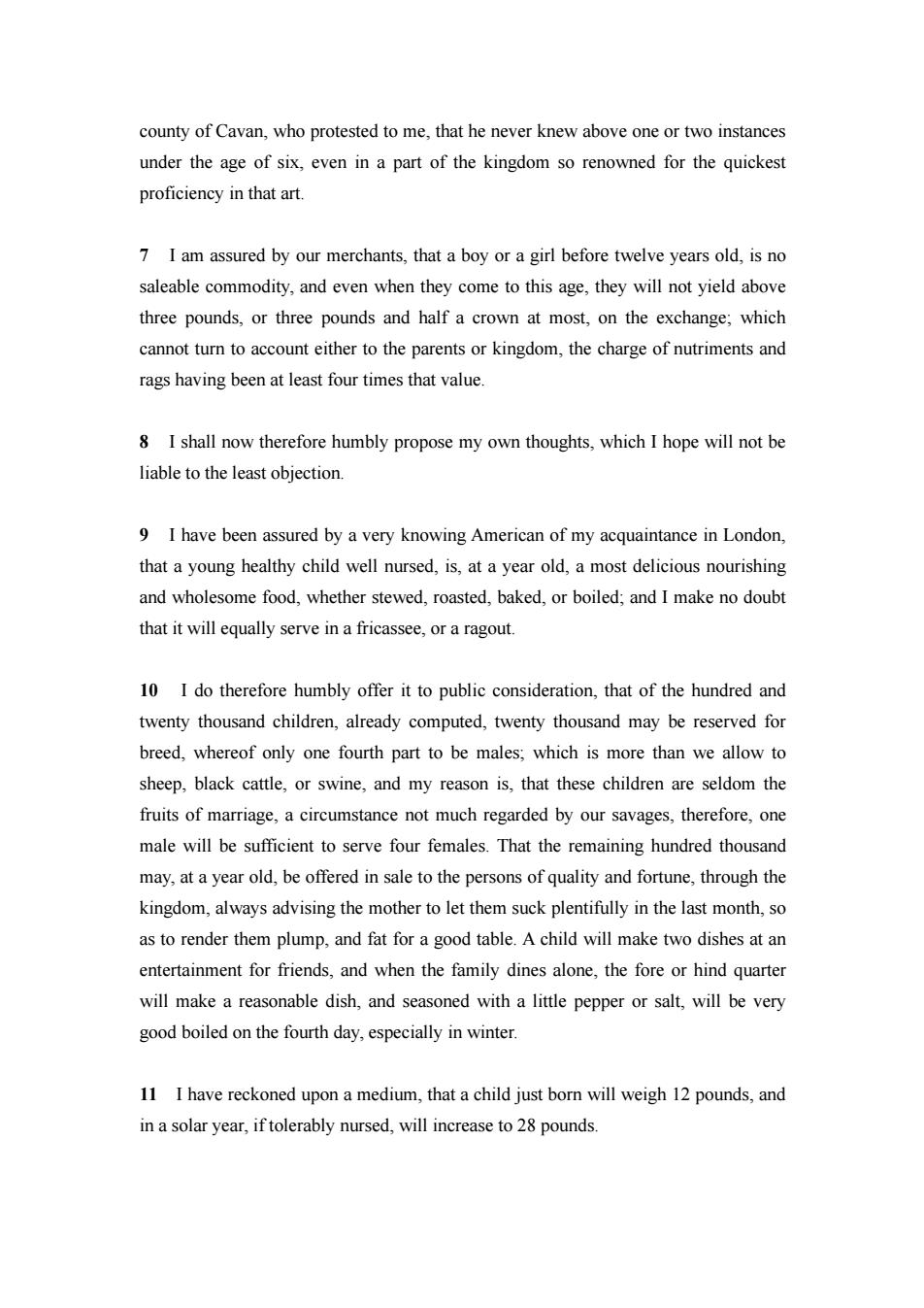
county of Cavan,who protested to me,that he never knew above one or two instances under the age of six,even in a part of the kingdom so renowned for the quickest proficiency in that art. 7 I am assured by our merchants,that a boy or a girl before twelve years old,is no saleable commodity,and even when they come to this age,they will not yield above three pounds,or three pounds and half a crown at most,on the exchange;which cannot turn to account either to the parents or kingdom,the charge of nutriments and rags having been at least four times that value. 8 I shall now therefore humbly propose my own thoughts,which I hope will not be liable to the least objection. 9 I have been assured by a very knowing American of my acquaintance in London, that a young healthy child well nursed,is,at a year old,a most delicious nourishing and wholesome food,whether stewed,roasted,baked,or boiled;and I make no doubt that it will equally serve in a fricassee,or a ragout. 10 I do therefore humbly offer it to public consideration,that of the hundred and twenty thousand children,already computed,twenty thousand may be reserved for breed,whereof only one fourth part to be males;which is more than we allow to sheep,black cattle,or swine,and my reason is,that these children are seldom the fruits of marriage,a circumstance not much regarded by our savages,therefore,one male will be sufficient to serve four females.That the remaining hundred thousand may,at a year old,be offered in sale to the persons of quality and fortune,through the kingdom,always advising the mother to let them suck plentifully in the last month,so as to render them plump,and fat for a good table.A child will make two dishes at an entertainment for friends,and when the family dines alone,the fore or hind quarter will make a reasonable dish,and seasoned with a little pepper or salt,will be very good boiled on the fourth day,especially in winter. 11 I have reckoned upon a medium,that a child just born will weigh 12 pounds,and in a solar year,if tolerably nursed,will increase to 28 pounds
county of Cavan, who protested to me, that he never knew above one or two instances under the age of six, even in a part of the kingdom so renowned for the quickest proficiency in that art. 7 I am assured by our merchants, that a boy or a girl before twelve years old, is no saleable commodity, and even when they come to this age, they will not yield above three pounds, or three pounds and half a crown at most, on the exchange; which cannot turn to account either to the parents or kingdom, the charge of nutriments and rags having been at least four times that value. 8 I shall now therefore humbly propose my own thoughts, which I hope will not be liable to the least objection. 9 I have been assured by a very knowing American of my acquaintance in London, that a young healthy child well nursed, is, at a year old, a most delicious nourishing and wholesome food, whether stewed, roasted, baked, or boiled; and I make no doubt that it will equally serve in a fricassee, or a ragout. 10 I do therefore humbly offer it to public consideration, that of the hundred and twenty thousand children, already computed, twenty thousand may be reserved for breed, whereof only one fourth part to be males; which is more than we allow to sheep, black cattle, or swine, and my reason is, that these children are seldom the fruits of marriage, a circumstance not much regarded by our savages, therefore, one male will be sufficient to serve four females. That the remaining hundred thousand may, at a year old, be offered in sale to the persons of quality and fortune, through the kingdom, always advising the mother to let them suck plentifully in the last month, so as to render them plump, and fat for a good table. A child will make two dishes at an entertainment for friends, and when the family dines alone, the fore or hind quarter will make a reasonable dish, and seasoned with a little pepper or salt, will be very good boiled on the fourth day, especially in winter. 11 I have reckoned upon a medium, that a child just born will weigh 12 pounds, and in a solar year, if tolerably nursed, will increase to 28 pounds